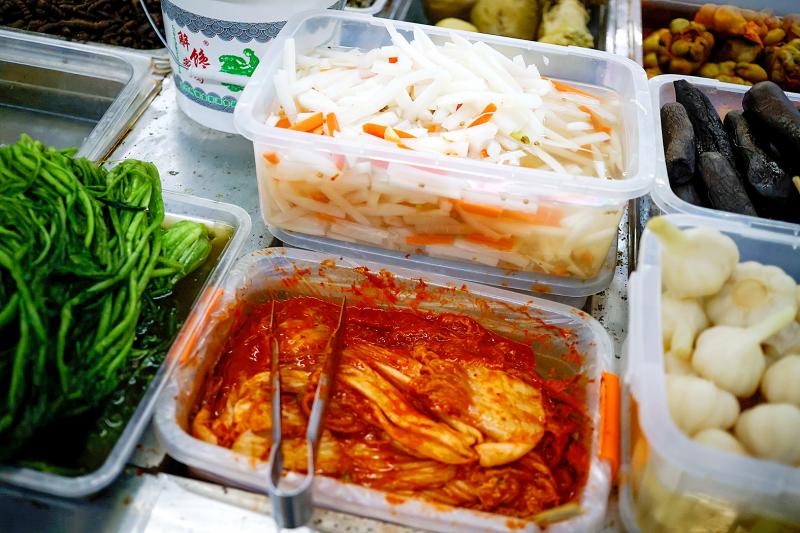China’s efforts to win an international certification for pao cai, a pickled vegetable dish from Sichuan Province, is turning into a social media showdown between Chinese and South Korean netizens over the origin of kimchi, a staple Korean cuisine made of cabbage.
Beijing recently won a certification from the International Organization for Standardization (ISO) for pao cai, an achievement the state-run Global Times reported as “an international standard for the kimchi industry led by China.”
South Korean media was fast to dispute such a claim and accuse the bigger neighbor of trying to make kimchi a type of China-made pao cai.

Photo: Reuters
The episode triggered anger on South Korean social media. “Its total nonsense, what a thief stealing our culture!” a South Korean netizen wrote on Naver.com, a widely popular Web portal.
“I read a media story that China now says kimchi is theirs, and that they are making international standard for it. It’s absurd. I’m worried that they might steal hanbok (South Korea’s national dress) and other cultural contents, not just kimchi,” said Kim Seol-ha, a 28-year old in Seoul.
Some South Korean media even described the episode as China’s “bid for world domination,” while some social media comments flagged concerns that Beijing was exercising “economic coercison.”
On China’s Twitter-like Weibo, Chinese netizens were claiming kimchi as their country’s own traditional dish, as most of kimchi consumed in South Korea is made in China.
“Well, if you don’t meet the standard, then you’re not kimchi,” one wrote on Weibo. “Even the pronunciation of kimchi originated from Chinese, what else is there to say,” wrote another.
South Korea’s agriculture ministry on Sunday released a statement saying mainly that the ISO approved standard does not apply to kimchi.
“It is inappropriate to report (about pao cai winning the ISO) without differentiating kimchi from pao cai of China’s Sichuan,” the statement said.

One of the biggest sore spots in Taiwan’s historical friendship with the US came in 1979 when US president Jimmy Carter broke off formal diplomatic relations with Taiwan’s Republic of China (ROC) government so that the US could establish relations with the People’s Republic of China (PRC). Taiwan’s derecognition came purely at China’s insistence, and the US took the deal. Retired American diplomat John Tkacik, who for almost decade surrounding that schism, from 1974 to 1982, worked in embassies in Taipei and Beijing and at the Taiwan Desk in Washington DC, recently argued in the Taipei Times that “President Carter’s derecognition

This year will go down in the history books. Taiwan faces enormous turmoil and uncertainty in the coming months. Which political parties are in a good position to handle big changes? All of the main parties are beset with challenges. Taking stock, this column examined the Taiwan People’s Party (TPP) (“Huang Kuo-chang’s choking the life out of the TPP,” May 28, page 12), the Democratic Progressive Party (DPP) (“Challenges amid choppy waters for the DPP,” June 14, page 12) and the Chinese Nationalist Party (KMT) (“KMT struggles to seize opportunities as ‘interesting times’ loom,” June 20, page 11). Times like these can

June 23 to June 29 After capturing the walled city of Hsinchu on June 22, 1895, the Japanese hoped to quickly push south and seize control of Taiwan’s entire west coast — but their advance was stalled for more than a month. Not only did local Hakka fighters continue to cause them headaches, resistance forces even attempted to retake the city three times. “We had planned to occupy Anping (Tainan) and Takao (Kaohsiung) as soon as possible, but ever since we took Hsinchu, nearby bandits proclaiming to be ‘righteous people’ (義民) have been destroying train tracks and electrical cables, and gathering in villages

Dr. Y. Tony Yang, Associate Dean of Health Policy and Population Science at George Washington University, argued last week in a piece for the Taipei Times about former president Ma Ying-jeou (馬英九) leading a student delegation to the People’s Republic of China (PRC) that, “The real question is not whether Ma’s visit helps or hurts Taiwan — it is why Taiwan lacks a sophisticated, multi-track approach to one of the most complex geopolitical relationships in the world” (“Ma’s Visit, DPP’s Blind Spot,” June 18, page 8). Yang contends that the Democratic Progressive Party (DPP) has a blind spot: “By treating any